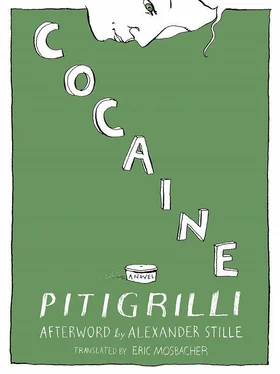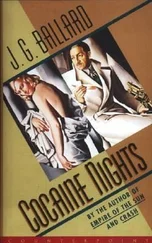Tropical heat and colonial atmosphere are much more agreeable in the imitations found in the subterranean tabarins of Paris.
Tito looked at the program and, as Maud’s turn was to be preceded by an English conjuror, an Egyptian magician and a German chanteuse, he went out into the street.
Fruit and vegetables were rotting in the dark and deserted market place. In a café where he ordered iced tea, he found a Marseilles newspaper.
Next to him a Senegalese sergeant, loaded with medals and golden badges, was waiting for his absinthe to settle. A French soldier, a typical je-m’en-fichiste from the boulevards, came in with elastic step and complete aplomb and sat down.
The Senegalese sergeant rose and rebuked him: “ Pourquoi ti pas saluer moi?” he said.
The young Parisian soldier looked with contempt at the black sergeant and said: “ Foutez moi la paix, vieux con.”
“ Et ça? Et ça?” the Senegalese sergeant protested pointing to the stripes on his sleeve.
“ Ça? Ça c’est de la merde de pigeon ,” the Parisian replied, and ordered himself some beer. The much bemedaled n.c.o. was at a loss for a reply and went back to his seat, where his absinthe had now completely settled, and he drank it with tropical austerity.
Tito went out into the street again. The sound of guitars and castanets accompanying a Spanish singer came from a sort of hut:
Dónde vas con mantón de Manila ?
Dónde vas con vestido chinés?
A kind of stage manager greasily pressed him to go in and see the show, which had only just begun.
A boy sold him some oranges.
Everything in Africa has a cooked, burnt taste. Flowers smell like dried specimens in a herbarium; women’s flesh smells of stew; and when you eat fruit you have the warm sweet taste of jam in your mouth.
He retraced his steps and went back into the concert room in the governor’s palace.
The German chanteuse, who was as blonde as zabaglione, was singing Alfred de Musset’s melancholy verses to the music of the Merry Widow:
… Quand je mourrai,
Plantez un saule au cimetière.
The intellectual native ladies in the audience applauded with much perspiration and enthusiasm.
Then came Maud’s turn.
To Tito she had never looked so beautiful.
She turned and twisted in a new dance, to the rhythm beaten out by wooden heels on the stage. Her whole body seemed to be free of joints and her soft, apparently boneless arms rose towards the sky, the rectangular African sky in which all the stars in the world had gathered to watch her; oh, those miraculously bare arms, how they rose and stretched towards the stars. Maud was a soft, elastic thing that curved right, left and forward with the suppleness of a lily whose flower is so heavy that it bends its perfume-dazed body right down to the ground. Pearls of sweat shone on her breast and arms and round her ankles, and roses and hairpins fell from her loose hair. She smiled, showing all her white teeth and two big, astonished eyes like those of a bird of prey. Rouge as well as perspiration dripped from her lips; it might have been drops of blood. The black stains of her armpits shone as they had never done even in nights of passion. And she went on dancing, bending this way and that like the stalk of a lily in the grip of a hurricane.
Serpentine writhings alternated with languid amorous, feline suppleness; an evil light flashed in her eyes and gave way to a smile of caressing sweetness. Passion, capriciousness, cruelty, evil succeeded each other in her eyes.
Tito remembered a dance like this long ago in distant Paris at a white mass in Kalantan’s villa on the Champs Elysées. How everything repeated itself, how everything returned.
Cocaine went down on her knees and bent backwards, forming a bridge, as if offering her sex to the pit.
She rose again and smiled.
Rage suddenly overwhelmed her; her heels beat a furious tattoo and she writhed as if transfixed by some unclean thing; then she sank to the floor, rose again, twisted and turned, smiled at the sky, then paused motionless for a moment, gazing at the stars as if transfixed by wonder; then she collapsed like a lifeless body and did not rise again except to smile and thank the audience that applauded with black hands and incomprehensible cries.
Tito could see nothing but the violet nails on hundreds of brown applauding hands.
Outside in the street there was a queue of antiquated cars.
The burnouses, the turbans, the bare arms, the khaki uniforms, the musicians, the Egyptian magician and a woman with a box of instruments under her arm all left; so did the blonde German singer, surrounded by a group of hungry officers; and last of all came Maud, alone.
The heat had gone, and a refreshing breeze came from the sea.
Tito put his arm round Cocaine’s waist, and they walked towards the white point of a mosque set in a kind of oasis where two endless caravan routes began.
They walked in the night and in solitude (after leaving the last huts behind them) with the springy steps of a couple of adolescents going for their first evening walk after declaring their love for each other. But a feeling of approaching death hung over them.
“I left Buenos Aires to go back to Italy, and tonight I’ve danced for the last time. I’m not beautiful any longer. I’ve put a little money aside, and I shall retire to that fourth floor flat facing the courtyard where the smells from rich kitchens gave me a frantic desire to be well off. Do you remember? Perhaps I may still find some man who won’t dislike me, or perhaps I’ll die alone. I’m at a point in my life when I’m faced with a parting of the ways, like these two great roads leading heaven knows where in Africa. I think that whichever I choose will lead to my dying in poverty sooner or later.”
That was how Maud spoke, inconsolably. But Tito had never believed in human discouragement. Basically we are all optimists. There are people who actually look for love in the advertisement columns of a newspaper. With the passing of time we develop a capacity for compensation, like the blind, who develop their senses of touch and hearing. As we grow old we adapt ourselves. Artists who believe they are finished when their first gray hair appears still feel young when they have white beards. Women who genuinely resign themselves to spinsterhood at the age of thirty discover at the age of thirty-five that their hopes of finding a husband have revived. When the first wrinkle appears they say I’m ugly and no man will ever look at me again, but ten years later they know they are still capable of kindling incendiary passions.
You can’t be a woman’s last lover because, however old or ugly she may be, she still believes she will be able to find another one.
But Cocaine went on: “I asked you to come and meet me at Dakar so that we could do the last lap of the journey home together. The letter you wrote to me about your life in Turin was so sad and so lonely that I felt terribly sorry for you. You talked about dying. I too feel ready to die.”
Cocaine spoke these words in quiet, subdued tones, with one of her arms in Tito’s heated hand. They walked without heeding where they were going; the immensity of the desert is more difficult than the most complicated labyrinth.
A patrol of soldiers emerged from the darkness and stopped.
“Be careful,” the corporal in charge said, “because very soon the Great West African Express will be coming, and you’re near the line. It’s a very treacherous train, because you don’t hear it, as there are no walls in this solitude to echo and transmit the noise.”
“Thank you,” said Tito.
“ Pas du tout, mon prince. Bonne nuit à la dame.”
Читать дальше



